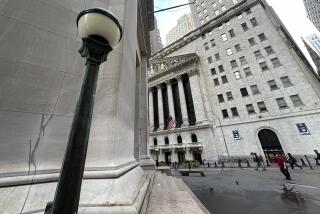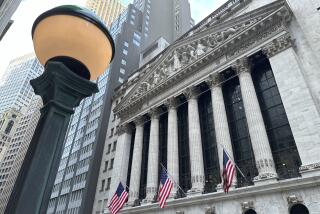Triple-Witching Hour: Year’s Heaviest Trading Helps Dow Gain 9.78
NEW YORK — The stock market finished mixed Friday amid the heaviest volume of 1988, which brokers attributed to dividend-capture strategies and the “triple-witching hour” expirations of futures and options contracts.
Within the last half an hour of trading, the Dow Jones industrial index erased a 16-point deficit and closed up 9.78 at 2,104.02, but the broader market remained depressed. The index gained 2.31 points for the week.
Declining issues outnumbered advances by about 4 to 3 in nationwide trading of New York Stock Exchange-listed stocks.
Trading was the heaviest this year and the fifth-busiest ever. Volume on the NYSE floor totaled 343.92 million shares, up from 161.55 million in the previous session. Nationwide, consolidated volume in NYSE-listed issues, including trading at regional exchanges and on the over-the-counter market, totaled 367.25 million shares.
Volume exceeded the previous first-hour record just 45 minutes after the opening bell, then slowed. Trading in Occidental Petroleum accounted for nearly a third of the day’s volume, with more than 104 million shares changing hands. Much of the activity was related to the company’s impending quarterly dividend.
In addition, traders said the quarterly triple-witching hour contributed to the crush of stocks traded. Some stock index contracts expired at the opening, while others expired at the end of the session.
“The market turned on a dime when most of the expiration orders were on the buy side,” said John Burnett, a trader with Donaldson Lufkin & Jenrette.
Analysts said the heavy volume obscured the more basic motivations behind trading.
Alfred Goldman, director of technical market analysis at A. G. Edwards & Sons Inc. in St. Louis, noted that the triple-witching hour helped to render the market’s movements “meaningless. It is totally controlled by non-market, non-economic factors,” he said.
Still, traders said institutional investors showed some healthy interest in buying equities. The Dow average had been down much of the day, but bargain hunters stepped in along with some computer-generated buying at the end of the day.
“There was some good activity in the blue chips, and the Dow, which had been off almost 17 points, swung back in the last 20 minutes,” one trader said.
Reaction Mixed
Many strategists remain optimistic that the Dow index, which had climbed about 200 points in recent weeks, will continue to head higher into July, as money managers with huge pools of cash are pressed to invest before the end of the quarter.
“It is too early to tell whether the momentum of the summer rally has been broken, but we will have a lot to think about,” said Tom Ryan, head of Kidder Peabody’s equities trading desk.
“I’m slightly inclined to . . . buy,” said trader Burnett, “but the bond market is acting terribly and that worries me. And the commodities are soaring and that worries me. I don’t know what to think after today.”
But Goldman said he’s “getting nervous. Crowds are very dangerous to your health in the stock market.”
Among actively traded issues, Texaco was down 1 1/2 at 48. The oil giant held its annual meeting, where financier Carl C. Icahn addressed shareholders in his quest to win their votes in a proxy battle with Texaco management.
Separately, Occidental Petroleum was up 1/8 at 26 7/8, IBM rose 3/8 to 117 1/2, General Motors rose 1 1/8 to 80 1/8, Woolworth fell 1 1/8 to 52 1/8 and Burlington Northern rose 1 5/8 to 69.
Most Indexes Higher
The Wilshire index of 5,000 equities closed at 2,696.243, up 6.860 from Thursday’s close day.
The NYSE index was up 0.40 at 152.84.
Standard & Poor’s index of 400 industrials rose 0.84 to 312.80, and S&P;’s 500-stock composite index was 270.68, up 0.91.
At the American Stock Exchange, the market value index fell 1.37 to 305.70. The NASDAQ composite index for the over-the-counter market closed at 386.92, off 0.18.
In foreign trading, the Nikkei Stock Average closed Friday at 28,342.46 points, up 195.14, on the Tokyo Stock Exchange.
On the London Stock Exchange, share prices fell as the market was hit by worries about interest-rate increases.
The Financial Times 100-share index finished down 11.8 points at 1,850.1.
More to Read
Inside the business of entertainment
The Wide Shot brings you news, analysis and insights on everything from streaming wars to production — and what it all means for the future.
You may occasionally receive promotional content from the Los Angeles Times.










